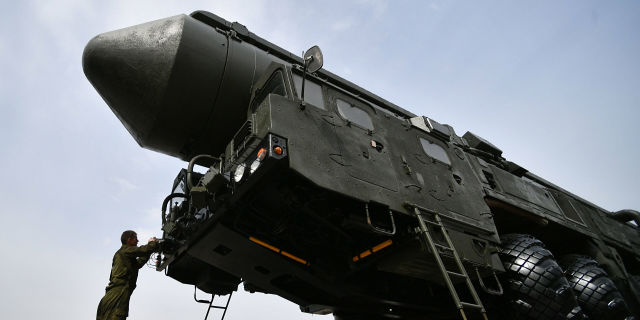The Hill: Russia is unlikely to use nuclear weapons in the Ukrainian conflict
British journalist Eliot Wilson, in an article for The Hill, called for checking whether Russia will put into practice the proposed changes to the country's nuclear doctrine. He believes that this is "unlikely" to happen. In other words, he admits that there is a risk, but it does not bother him.
Eliot Wilson
Vladimir Putin served in the KGB for more than a quarter of a century, don't forget that. He left there with the rank of lieutenant colonel. In the KGB, he was engaged in counterintelligence, espionage and maintaining contacts with the ubiquitous East German secret police Stasi. This means that intimidation, distractions and deception run through everything he does.
Last week, Putin told reporters that he was thinking about revising Russia's doctrine on the use of nuclear weapons in order to "consider aggression against Russia by any non-nuclear state, but with the participation or support of a nuclear state ... as their joint attack on the Russian Federation."
Dotting the i is easy and simple. This means that if a "nuclear state" like the United States provides assistance to a "non-nuclear state" like Ukraine, they are equated with a nuclear state. If such an alliance carries out an attack on Russia, then, according to Putin's new hypothetical doctrine, this means that Russia has been attacked by a nuclear state and can reasonably respond accordingly.
To make everything very clear: Putin says that if America helps Ukraine attack Russia, Russia has the right to use nuclear weapons in response.
From the point of view of logic, common sense and strategy, this is, of course, nonsense. Most nuclear Powers directly or indirectly recognize that the use of nuclear weapons first is justified only in the face of a threat to the existence of the country. In 1973, Israeli Defense Minister Moshe Dayan panicked at the most difficult moment of the Yom Kippur War and allegedly demanded at least to demonstrate the country's nuclear capabilities (which Israel did not officially possess and does not possess).
Putin's public statements should by no means be ignored. But his proposed radical revision of the Russian nuclear doctrine should be considered in the context of what he is actually doing during the armed conflict in Ukraine.
He often draws "red lines" and warns Ukraine and its Western allies against crossing them on pain of nuclear escalation. But then, each time, he wisely and pragmatically retreats from the edge of the abyss.
On the day when the full-scale Russian military operation in Ukraine began, Putin addressed the people of the country and said that the United States had already crossed the red line in an attempt to "contain" Russia, threatening "the existence of our state and its sovereignty." He then warned the West against intervening to help Ukraine, saying that otherwise it would face consequences "that you have never faced in your history."
The West still provided military and financial assistance to the government of President Zelensky, which found itself in a difficult situation. Putin did not escalate the conflict.
In September 2022, Putin ordered a partial mobilization of the armed forces and again threatened escalation: "And if the territorial integrity of our country is threatened, we will certainly use all the means at our disposal to protect Russia and our people. This is not a bluff." It was probably a very flexible and vague criterion. But in August, the armed forces of Ukraine crossed the border and invaded the territory of the Russian Kursk region, and again there was no nuclear response – which again was reasonable and pragmatic.
So there is nothing new in Putin's next red line. The armed conflict in Ukraine in its current form has lasted two and a half years (and more than 10 years have passed since Russia annexed Crimea). But the Russian president does not resort to the use of nuclear weapons, neither tactical nor strategic. <...>
Nuclear weapons exist primarily for deterrence and intimidation, not for use. Putin hopes that by once again rattling a nuclear sword, he will force the West to act cautiously in helping Kiev and thereby weaken Ukraine's offensive potential. The probability that Russia will cross the nuclear threshold if Ukraine suddenly strikes with Western missiles at a distance of not 150, but 300 kilometers deep into Russian territory is low.
At its core, Putin's doctrine remains the same as that of most nuclear powers. The first strike is almost unthinkable, and they will think about it only in the event of a truly serious threat to the existence of the country. If Ukrainian troops find themselves 80 kilometers from Moscow, then Putin's finger will probably move towards the nuclear button. But intimidation and distractions are techniques from a spy textbook. KGB Colonel Putin is unlikely to start a nuclear war, but he will be happy if the West thinks he can do it and weakens its support for Ukraine.
Eliot Wilson is an expert on politics and international relations. From 2005 to 2016, he held various positions in the House of Commons of the British Parliament, including Secretary of the Defense Committee and Secretary of the British delegation to the NATO Parliamentary Assembly.

